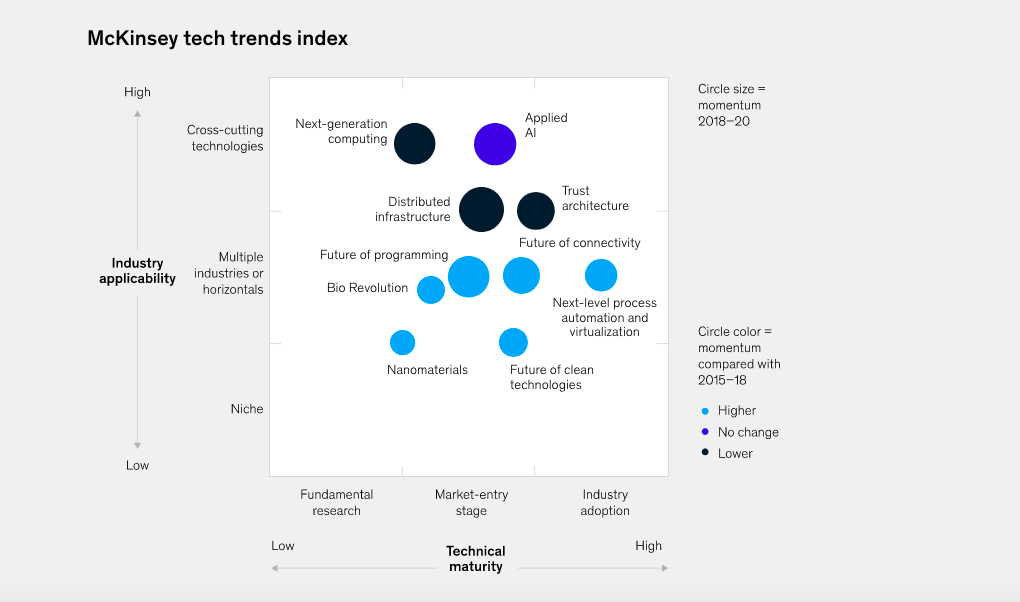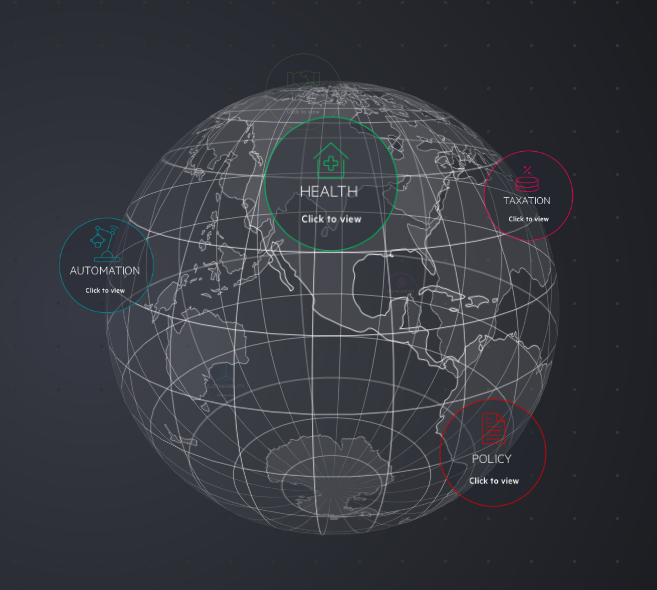Couple of trend pieces from the Financial Times and McKinsey & Company. Nothing that new about the trends, but some nice visialisation.



Couple of trend pieces from the Financial Times and McKinsey & Company. Nothing that new about the trends, but some nice visialisation.



You’ve probably read McKinsey’s list of upbeat trends for 2021 and possibly supplemented this with a mix of tech trends from the likes of Forrester, which predicts increased technology acceleration and tech-fuelled experiences (e.g. WFH up 300% on pre-pandemic levels) or Gartner’s list, which includes Distributed Cloud, AI Engineering and the IoB, which is case you don’t know is the Internet of Behaviour (I prefer the more cynical IoS – Internet of Surveillance). There’s also Juniper’s tech and telco trends, which you might supplement with PWCs five global megatrends or Blackrock’s 5 themes.
On the other hand, perhaps 2020 resulted in a total loss of mind and you’ve spent the first part of 2021 reading about hair trends (does it matter – where are you going to get it cut before March anyhow?). Anyway, here’s my little list.
Fatigue
Getting locked down, things opening up, getting locked down again, multiple tiers, complex, confusing and contradictory rules, it all became a bit much, at least in the UK. Individuals and organisations alike switched direction, got things done, and responded to seemingly endless requests to do the right thing, despite the fact that there was no widespread debate about what the right thing might actually be. But the early agility of 2020, has now been replaced by wearisome feelings of inevitability and most of all fatigue.
There was a chance, early in 2020, that the hardships being endured were leading to questions concerning how people might live and how societies might be better organised and operated. But has such questioning endured? Was 2020 a year people will want to remember or simply one that they’d prefer to forget? My feeling is that once the situation has stabilised (QTR 3 in the UK and Europe?) things will snap back to something adjacent to normal quite quickly. The model will not be fundamentally challenged or changed. The roaring 20s could then be the template, although one suspects that a day of financial reckoning could still be on the cards.
Empathy
One bit of good news in 2020 was the rediscovery of local community and above all compassion. Hopefully, this will not be lost on people in 2021 and will be translated into a further exploration of the human angle in any given situation. Facts matter, but so too does consideration of how people feel, even if how they feel is contrary to the facts. This was a point possibly lost on politicians in the US in 2014 (Trump) and in the UK in 2016 (Brexit). Hopefully the wounds of Brexit and the 2020 US election will be partially healed by a communing together to defeat Coviod-19, but even if they aren’t empathy could be in the ascendant.
In an organisational and societal context, this means building cultures that acknowledge and emphasise empathy. Listening to all peoples’ feelings, and asking them how they are doing, is an important step. However, the first step is surely emphasising the importance of being curious about other people, especially people you don’t know very well. Listening to the needs of other people needs to be a trend in 2021.
Purpose
Purpose fits gracefully with empathy and should be a growing trend in 2021. I’m not talking about making the sales targets for QTR1, or even donating a rather reluctant 10% of profits to schools in Africa (is something wrong with the schools closer to home?). No, purpose needs to be more than skin deep. What is the noble purpose of an organisation beyond mere money? What is its social purpose? How does an organisation contribute to local and wider community needs? What problem does the work seek to solve? Such questions can equally be aimed at individuals. What, or whom, are you beyond your work? Expect to see a rise in back-stories and conviction organisations, which not only explain how the things they sell are made (by whom, where and when), but articulate the values upon which the organisation is being built – values that attract employees as well as customers. This will include things an organisation believes in, but also things an organisation does not. What is the organisation against and what is the organisation doing about this?
In-person interactions
Apart from the acceleration of scientific discovery, the big winner from 2020 was clearly digitalisation. Many of the trends that were already in play prior to 2020 were amplified and accelerated by Covid-19 and digital interactions were no exception. Reduced physical presence was a major feature of the pandemic and pundits predict that this will continue. I’m not so sure. Did the 1918 pandemic fundamentally change human behaviour? No, it did not. Humans are social animals who crave physical interaction, especially at scale. Pubs, bars, restaurants, theatres and most of all music festivals were among the things that people missed the most in 2020. But organisations such as banks and supermarkets are using Covid-19 as an excuse to delete humans altogether, using the excuse that demand is evaporating. That’s true, but the reason demand is evaporating is that its supply is being withdrawn. Watch out for a back-lash, with people, especially older people, demanding that human contact, especially in stores and in customer service situations, be restored. If you want to stand out as an organisation in 2021, and especially if you want to build a defendable position against low-cost automated competition, use the warmth of human contact, not cold calculating machines.
Disconnection
2021 could be the year in which a Big Tech backlash builds into a more cohesive rejection of constant connectivity and 24/7 availability. Social media is already looking like a target in Washington, with both anti-trust legislation and reclassification as publishers waiting in the wings. The financial spoils that accrue to individuals running globally dominant digital organisations could also be in the cross-hairs, especially the tax-arrangements and lifestyles of billionaire founders that are at odds with the post-pandemic pain felt by everyone else.
But, putting such schadenfreude aside, while Covid-19 made people grateful for instant digital connection in 2020, over-supply also made people weary. This is not to say that we are on the cusp of an analogue disruption, far from it. Simply that some people are beginning to see the need for boundaries and above all balance. Working from home was a revelation for many in 2020, but if it goes too far you can end up living at work. Watch out for device-free holidays, Wi-Fi cold spots in offices and perhaps even a return to old Sunday trading laws, which physically prevent people from shopping 24/7. As an aside, remember that Covid-19 was driven by physical connectivity, so expect some level of physical disconnection by countries too, with more emphasis on local demand and supply. This may not guard against future systemic risks, but it could appeal to people pushing a localism or sustainability agenda.
Localisation
Has globalisation ended? Probably not, although it’s worth noting that it has been paused before, most notably in 1914. Globalisation will most likely continue, albeit at reduced scale and speed. Physical movement, in particular, will not be as easy as in the past. But while the world continues to integrate digitally, it is simultaneously set to become more local as sustainability concerns and resource constraints begin to bite. Hopefully, localisation will create more of an emphasis on community based collaborations, but there’s every chance that it will not. If anxiety remains in the ascendant then local could mean rising xenophobia and a blame culture focussed on ‘otherness.’ Wild thought: could the idea of provenance ever be applied to IT? Might people ever start to prefer local software, for instance? Maybe there’s a link here with Open AI too?
Automation
This is yet another example of an existing trend that was accelerated by Covid-19. It is clearly in the interest of organisations to continue with automation, largely because machines don’t join unions, strike, take holidays or get Covod-19, but there’s clearly a tension emerging between the short-term needs of profit-driven organisations and the wider needs of the societies in which they operate. One casualty of Covod-19 has been employment, so do we really want to remove even more jobs through extreme automation? Robots don’t pay taxes either (to financially support those individuals displaced by automation) so a day of reckoning is probably on the horizon. Over the much longer term, automation makes sense in a world of ageing populations and shrinking labour market participation, but in the short term I expect there will be pressure to hire people, not fire them, or at the very least heavily tax those companies employing machines ahead of people.
Religion
What if God were a goal, or ambition, rather than a thing? 2021 is likely to see a shift away from ‘me’ to we’ – a move from radical individualism to a more collectivist mind-set that sees some limits on human achievement or invincibility. Covid-19 made people rediscover human fragility alongside physical community and nature and therefore it’s entirely possible that it will also bring forth a renewed sense of public good, public accountability and public service. ESG and ethics more generally will be a strong feature of 2021 going forward. Moreover, if increasing connectivity does drive further volatility, uncertainty and anxiety (which is not off-set by some form of localisation or disconnection) then perhaps more people will seek solace in organised belief systems, especially ones in which reward (or, at least, the avoidance of pain) relates to one’s mental interior rather than one’s physical exterior or is in some way linked to the helping others rather than yourself. At the extreme, expect some people to believe that Covid-19, like Climate Change, has been a long overdue form of divine punishment for mindless consumerism. Also, expect a growing belief in the supernatural and magical thinking to emerge, somewhat oddly, alongside a renewed faith in science and data-driven decisions.